Resurrection Day Collection
Digital Logos Edition
Overview
The Resurrection Day Collection includes eight titles that feature outstanding scholarship and practical pastoral guides. Deepen your understanding of Jesus’ resurrection by exploring how it fits into the context of the Davidic tradition; for example, which Old Testament promises were fulfilled and what does their fulfillment say about the Messiahship of Christ? Situate Jesus’ resurrection within the context of Jewish and Hellenistic understandings of the afterlife, and discover why this context is important. Gain perspective on how the resurrection of Jesus can and should inform everyday life. Finally, learn how to gently lead those under your care to appropriate the hope and power of the resurrection to the painful and perplexing circumstances in their lives.

- Features in-depth scholarship that places the resurrection in its Jewish and Hellenistic context
- Offers a pastoral perspective on the meaning of the resurrection for everyday life
- Appropriates the hope and power of the resurrection to painful and perplexing circumstances
Individual Titles
- Eastertide Sermons by Henry Alford
- Glory Not Dishonor: Reading John 13–21 by Francis J. Moloney
- But God Raised Him from the Dead by Kevin L. Anderson
- Joy Comes in the Morning: The Glorious Victory of the Resurrection by Don Anderson
- Living the Resurrection: The Risen Christ in Everyday Life by Eugene H. Peterson
- Raised from the Dead According to Scripture: The Role of the Israel’s Scripture in the Early Christian Interpretations of Jesus’ Resurrection by Lidija Novakovic
- The Resurrection: The Unopened Gift by Gerard Chrispin
- Surprised by Hope by N.T. Wright
This title is included in the following collections
You can save when you purchase this product as part of a collection.
Verbum 9 Portfolio Legacy Libr...
$4,749.99$4,749.99Verbum 9 Ultimate Legacy Libra...
$7,749.99$7,749.99Logos 9 Ultimate Legacy Librar...
$24,999.99$24,999.99
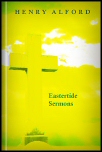
Alford draws us into his sermons about the resurrection by showing the reader how much we today can identify with the journey of the disciples and women that discovered Christ’s empty tomb. Many wrestling with the Bible have experienced the shattering of all we have known to be true, as was with the disciples when they first mourned Christ’s death and then in shock realized that he did indeed rise from the grave as he had promised. These four sermons begin with Christ’s resurrection and end with his ascension.
Henry Alford (1810–1871), a member of the Anglican Church, was an English theologian, textual critic, poet, writer, and hymnodist. Alford studied at Cambridge and became a Hulsean Lecturer there, after which he moved to London where he pastored a large church and became the dean of Canterbury. Other famous literary works of his include the lyrics to the hymn Come Ye Thankful People Come and The Greek Testament by Henry Alford.
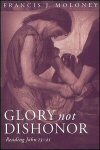
Glory Not Dishonor: Reading John 13–21
- Author: Francis J. Moloney
- Publisher: Fortress Press
- Publication Date: 1998
- Pages: 250
Professor Francis J. Moloney’s literary-historical commentary offers a close reading of the final section of the Gospel of John, taking the reader on a journey through Jesus’ final night and his ministry’s climax in passion, death, and resurrection. Concluding his unique trilogy, Moloney shows how the reader is led on a journey of faith by the Gospel writer, culminating in the belief in Jesus the Christ and having life in his name, despite his absence.
Francis J. Moloney is a senior professorial fellow of Australian Catholic University at its Melbourne campus, Australia, and member of the Department of Biblical Studies. He is also the former provincial superior of the Salesians of Don Bosco for Australia and the Pacific region and former Katharine Drexel Professor of Religious Studies and dean of the School of Theology at the Catholic University of America. Moloney is a fellow of the Australian Academy of the Humanities, a member of the Order of Australia, and the author of more than 40 books.
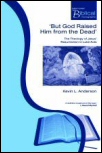
But God Raised Him from the Dead
- Author: Kevin L. Anderson
- Publisher: Paternoster Press
- Publication Date: 2006
- Pages: 306
In this book, the first full-scale study of the resurrection of Jesus in Luke-Acts, Kevin L. Anderson situates Luke’s perspective on resurrection amongst Jewish and Hellenistic conceptions of the afterlife, and within the complex of Luke’s theology, Christology, ecclesiology, and eschatology. He argues that the resurrection of Jesus constitutes the focus of the Lucan message of salvation.
This is a definitive treatment of the topic.
—I. Howard Marshall, author
Kevin L. Anderson is an assistant professor of Bible and theology at Asbury College, Wilmore, Kentucky.
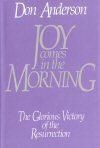
Contemplate the terror of the long night, the Savior’s sacrifice, and the wonder of the glorious morning.
It’s time we took another look at the cross and met the men and women who stood at its foot. Don Anderson takes us on a journey through that long dark night at Calvary. We see again the intensity of the Lord’s torment and the misery of his separation from the Father. It’s time we peer again into the empty tomb and realize the glorious reality of our salvation. Your heart will be challenged as you travel these well-worn paths, and the weary soul will take courage as you see firsthand that joy comes in the morning.
Don Anderson brings us back to the lifechanging truths of the death and resurrection of our Lord Jesus Christ. With wit, insight, and expertise, Don invites us to join him on a pilgrimage through sections of the Old Testament and the gospels that climaxes in a discussion of the ramifications of the resurrection.
—Joseph C. Aldrich, president emeritus, Multnomah School of the Bible
Don Anderson is a popular guest speaker at churches, para-church organizations, conferences, and retreats. His refreshing style and unique insights, as shown in many of his books, effectively communicate the timeless truths of Scripture and their application to everyday life.
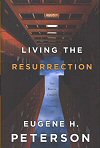
The resurrection of Jesus in not simply proof of his divinity, nor is the event something Christians should celebrate on one day of the liturgical year and then forget. The resurrection has crucial relevance for our spiritual formation every day.
Living the Resurrection immerses you in the life-changing experience of this biblical event. Join best-selling author and pastor Eugene Peterson as he reflects on the three aspects of Christ’s resurrection that define our lives and energize our faith:
- Resurrection wonder as the central focus of our life in Christ
- Resurrection meals as the invitation to spiritual formation in our most common daily experiences
- Resurrection friends as the intimate fellowship in whose midst the risen Jesus makes his joyful home
With writing that is full of life, beauty, and prophetic insight, Living the Resurrection brings you to the central place of life and faith—the resurrection of Christ.
Eugene Peterson is a man on whom God’s wonder is not lost. Thanks to his pen, not even a day passes that I don’t read and sigh, ‘I never thought of it that way.’
—Max Lucado, author
In this work, the resurrection ceases to be an abstract idea and is released again to be a force of wonder and fear that shapes our practice and life.
—John Ortberg, senior pastor, Menlo Park Presbyterian Church, Menlo Park, CA
As spiritual formation bids to become a fad among contemporary evangelicals, Eugene Peterson’s Living in the Resurrection offers them an alternative path rooted in wonder and gives results that are more than cosmetic.
—Frederica Mathewes-Green, Eastern Orthodox author and speaker
Our love for the Lord of glory will surely swell to new heights thanks to the wondrous faith displayed in this book that at once instructs and inspires. May our reading of Eugene Peterson’s heartfelt reflections be an Easter treat all year long.
—Susan Muto, dean, Epiphany Academy of Formative Spirituality
Euguene Peterson is a master interpreter of Scripture, a master teller of tales, and, in this book, a master practitioner of resurrection. Peterson enables the Easter faith to become a vivid reality.
—William H. Willimon, bishop, North Alabama Conference, The United Methodist Church
Eugene H. Peterson is a writer, poet, and retired pastor. He has authored more than 34 books (not including The Message). He is emeritus professor of spiritual theology at Regent College in Vancouver, British Columbia. Eugene also founded Christ Our King Presbyterian Church in Bel Air, Maryland, where he ministered for 29 years. After teaching at a seminary, he created The Message, a vibrant Bible paraphrase that connects with today’s readers like no other. It took Peterson 10 years to complete. He worked not from any English text but from the original Hebrew and Greek texts to guarantee authenticity. At the same time, his ear was always tuned to the cadence and energy of the English spoken every day on the streets. He lives with his wife, Jan, in Montana.
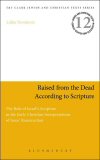
Raised from the Dead According to Scripture: The Role of the Israel’s Scripture in the Early Christian Interpretations of Jesus’ Resurrection
- Author: Lidija Novakovic
- Series: T&T Clark Jewish and Christian Text Series
- Publisher: T&T Clark
- Publication Date: 2012
- Pages: 272
This book investigates the scriptural arguments related to Jesus’ resurrection. Lidija Novakovic believes that the Davidic tradition supplied the primary scriptural categories for the claim that Jesus was raised from the dead according to Scripture. This tradition was appropriated through two major thematic trajectories: resurrection as the fulfillment of Davidic promises and resurrection as the messianic enthronement. We can also identify several related thematic trajectories, such as the concept of the resurrection as the beginning of the new creation, resurrection as the prophetic authentication, and resurrection as the messianic rebuilding of the temple. Each thematic block is based on a specific use of Scripture for the purpose of explaining the significance of Jesus’ resurrection.
Lidija Novakovic earned her PhD from Princeton Theological Seminary and is currently associate professor in the department of religion at Baylor University. She is the author of Messiah, the Healer of the Sick and a coeditor of The Dead Sea Scrolls: Hebrew, Aramaic, and Greek Texts with English Translations, volumes 3 and 6B.
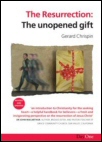
The Resurrection: The Unopened Gift
- Author: Gerard Chrispin
- Publisher: Day One Publications
- Publication Date: 1999
- Pages: 176
After summarizing in the first chapter the overwhelming evidence for the resurrection of Christ, the other chapters discuss the implications for daily living and understanding key Bible teaching. The gospel is covered from many angles and thus this is appropriate for those seeking, as well as Christians needing encouraging and teaching.
Reading this book gave me a growing awareness that the truth of Jesus’ resurrection influences all areas of our daily Christian lives.
—John Dargie, Grapevine
A helpful handbook for believers.
—John MacArthur, pastor-teacher, Grace Community Church, CA
A former criminal lawyer and manager, Gerard Chrispin is a Bible teacher and evangelist. He is an Associate Evangelist of Young Life, an itinerant pastor with the Fellowship of Independent Evangelical Churches, and former chairman of both United Beach Missions and its European subsidiary, Missions Vacances. He has authored several books, including The Bible Panorama (part of this collection). A former keen rugby player and cricketer, he is married to Phillippa, is a father of three, and a doting grandfather of five.
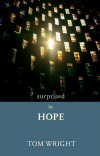
Surprised by Hope
- Author: N.T. Wright
- Publisher: SPCK
- Publication Date: 2005
- Pages: 112
What do Christians hope for? To leave this wicked world and go to ‘heaven’? For the ‘kingdom of God’ to grow gradually on earth? What do we mean by the ‘resurrection of the body’, and how does that fit with the popular image of sitting on clouds playing harps? And how does all this affect the way we live in the here and now?
Tom Wright, one of our leading theologians, addresses these questions in this provocative and wide-ranging new book. He outlines the present confusion about future hope in both church and world. Then, having explained why Christians believe in the bodily resurrection of Jesus himself, he explores the biblical hope for ‘new heavens and new earth’, and shows how the ‘second coming’ of Jesus, and the eventual resurrection, belong within that larger picture, together with the intermediate hope for ‘heaven’. For many, including many Christians, all this will come as a great surprise.
Wright convincingly argues that what we believe about life after death directly affects what we believe about life before death. For if God intends to renew the whole creation–and if this has already begun in Jesus’ resurrection–the church cannot stop at ‘saving souls’, but must anticipate the eventual renewal by working for God’s kingdom in the wider world, bringing healing and hope in the present life.
Lively and accessible, this book will surprise and excite all who are interested in the meaning of life not only after death but before it.
This unmissable book . . . is a must-read.
—Krish Kandiah for Christianity Magazine
N.T. Wright is a professor of New Testament and early Christianity at St. Andrews University. Previously, he was the bishop of Durham. He has researched, taught, and lectured on the New Testament at McGill, Oxford, and Cambridge Universities. He is best known for his scholarly contributions to the historical study of Jesus and the New Perspective on Paul. His work interacts with the positions of James Dunn, E.P. Sanders, Marcus Borg, and Rowan Williams, the Archbishop of Canterbury. Wright has written and lectured extensively around the world, authoring many books and numerous articles in scholarly journals and popular periodicals. He is best known for his Christian Origins and the Question of God series, of which four of the anticipated six volumes are finished.